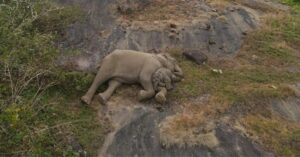Inspiring! Ladakh Mason Quits Job to Save 70+ Abandoned Animals With His Own Funds
"As a Buddhist, it’s my duty to take care of all sentient beings. We have a traditional practice called Tsetar (‘Life Release’), whereby animals destined for slaughter are bought and then released into their native environment."
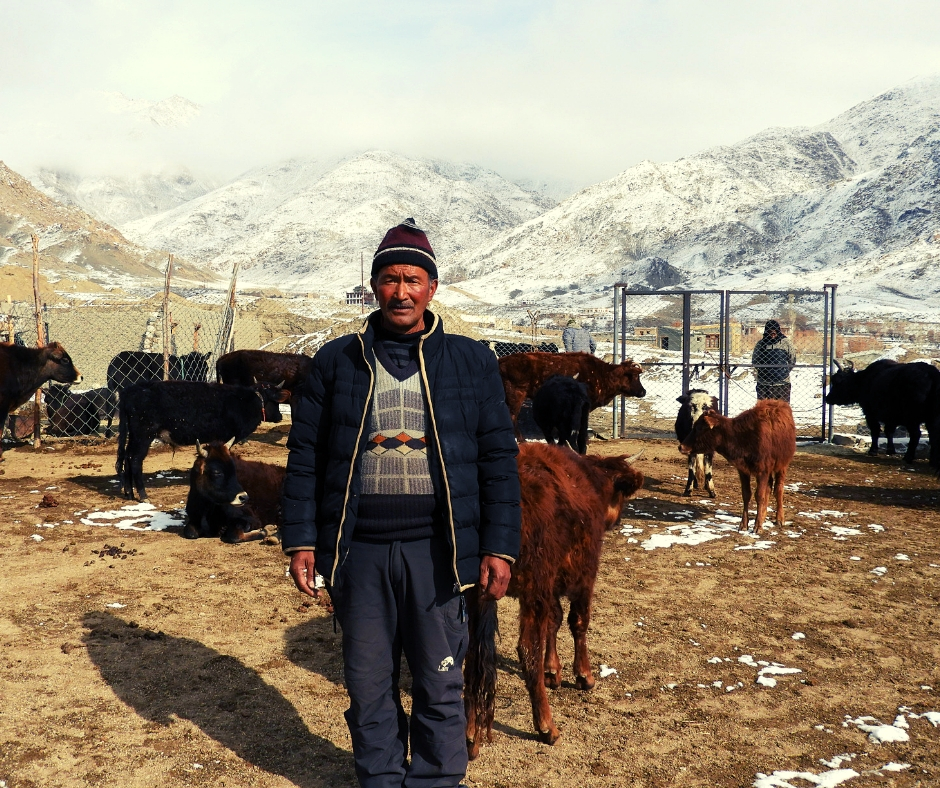
(UPDATE. We have some good news! Since we published this story, Tsering Dorjey, the 57-year-old animal shelter owner, has received donations amounting to Rs 61,000. If you’ve been inspired by his story and wish to further his efforts, you can contribute to the bank account number given below. Thank you, readers!)
“The abandonment of bulls, especially young calves greatly disturbed me. Many farmers see them as a financial liability after they have served their purpose. As a mason, I travelled to different parts of Leh district and it sickened me a lot to see these animals widely abandoned,” says Tsering Dorjey, a 57-year-old former mason.
Dorjey could not stop thinking about the plight of those animals. He knew he had to do something. So, in 2013, he started an animal shelter in his village, Taru outside Leh. Wanting to devote his full time to animal rescue, he gave up his profession the moment he set up the shelter.
“My parents were small farmers. I started masonry work when I was 18 years old and continued till I was 51 before starting the animal shelter in 2013. As a mason, I had visited many villages and observed that none of the oxen were being taken care of,” says Dorjey, in an exclusive conversation with The Better India (TBI).
The turning point came when Dorjey visited Basgo village (nearly 40 km from Leh) for masonry work. Every day he saw trucks carrying bulls and other animals to Kargil for slaughter. The sight of these caged animals and the fate that awaited them deeply saddened him.
“Before anything else, I asked myself how I can save these animals. It’s what prompted me to establish the animal shelter,” adds Dorjey.
After witnessing this painful sight in Basgo, Dorjey solicited the help of his fellow villagers for land to house these abandoned animals. The villagers forwarded help in the form of 4-5 kanals (one eighth of an acre) of land on a provisional basis. Soon, the residents themselves began taking their animals to his shelter.
In fact, Dorjey remembers one distinct incident when one villager decided to sell his Dzo for slaughter to another family. Upon hearing the news, he rushed out to bring the Dzo back to his shelter. Following this incident, residents of nearby towns and villages like Choglamsar, Basgo, Alchi, Martseland and Spituk also began bringing their animals to his shelter.
Today, this shelter in Ladakh is home to approximately 70 animals, including four cows, eight-nine Dzos and Dzomos (a crossbreed of yak and cow), sheep, donkey, and bulls which take up the highest numbers.
Dorjey takes his animals to higher reaches during summers for grazing. In winter they are fed on manufactured feed, available on government subsidy, and dry fodder.
“Also, food waste from nearby Pathar Saheb Gurudwara is of great help. It’s the springtime which is the most difficult; there is lack of water as the glaciers melt only in summer time. Last year, 11 animals died due to deficient precipitation. If the animals fall sick, they are taken to a village dispensary unit in my village that two people run,” says Dorjey.
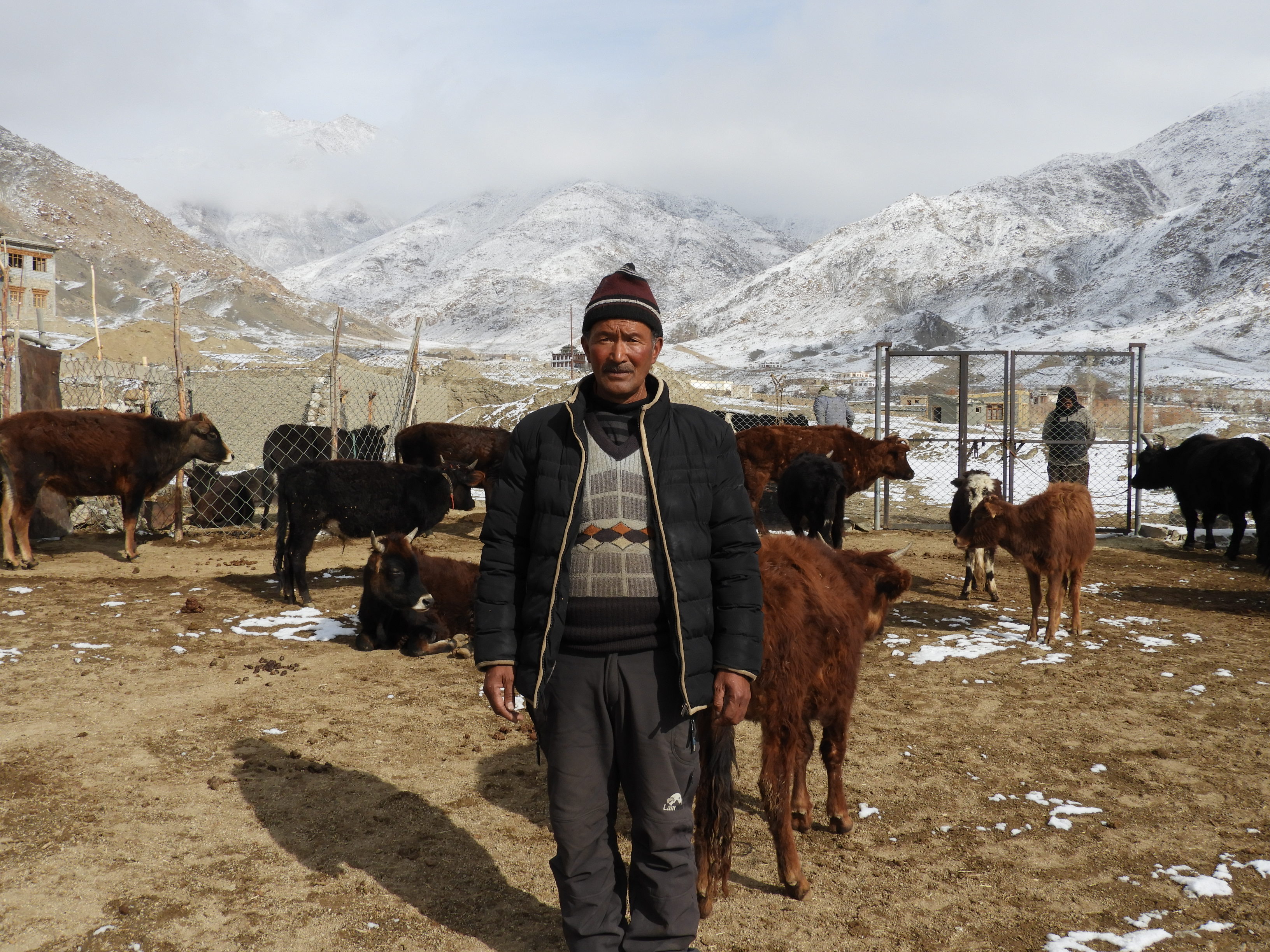
Last year, Dorjey started an association for animal care called Taru Gayphel Tsogspa in a bid to organise his efforts. It is a registered organisation which now has 15 members.
“It was Dr Mohammad Iqbal, the Chief Animal Husbandry officer in Leh, who advised me to form an association to further strengthen my efforts to protect these vulnerable beings,” adds Dorjey.
Although Dorjey has no official account of the costs, he claims to have shelled out approximately Rs 5-6 lakhs for the shelter from his own pocket.
“Our association asked the local administration for a grant of land. The Ladakh Autonomous Hill Development Council, Leh, will most probably grant about 7-8 kanals of land to us within Taru village. Till then, the current shelter will house the animals,” informs Dorjey.
Dorjey has endured serious financial difficulties in maintaining the shelter yet he still hopes to give a better shelter to his beloved animals. Lack of adequate financial resources makes it difficult to run the place. In 2018, he hired a staff member, paying him Rs 12,000 per month from his own savings. There are certain occasions where people forcibly leave their animals in the shelter, and he does not have the heart to say no to them.
“Financial support can save more animals and generate much needed employment opportunities,” he adds.
He depends heavily on the generous support of donors and locals to run his animal shelter. During spring time last year, he faced real shortage of fodder due to deficient snowfall leading to water shortages in the village. Responding to this emergency, he took to the upper reaches of his villages to provide food and water to the animals.
However, what keeps Dorjey going is his abiding faith in the basic tenets of Buddhism.
“I believed from the very beginning that as a Buddhist, it’s our duty to take care of all sentient beings. Even before I started the shelter, I convinced a lot of people to adopt animals ready for slaughter. This is part of our Buddhist tradition called Tsetar (‘Life Release’), whereby animals destined for slaughter are bought and then released into their native environment,” says Dorjey.
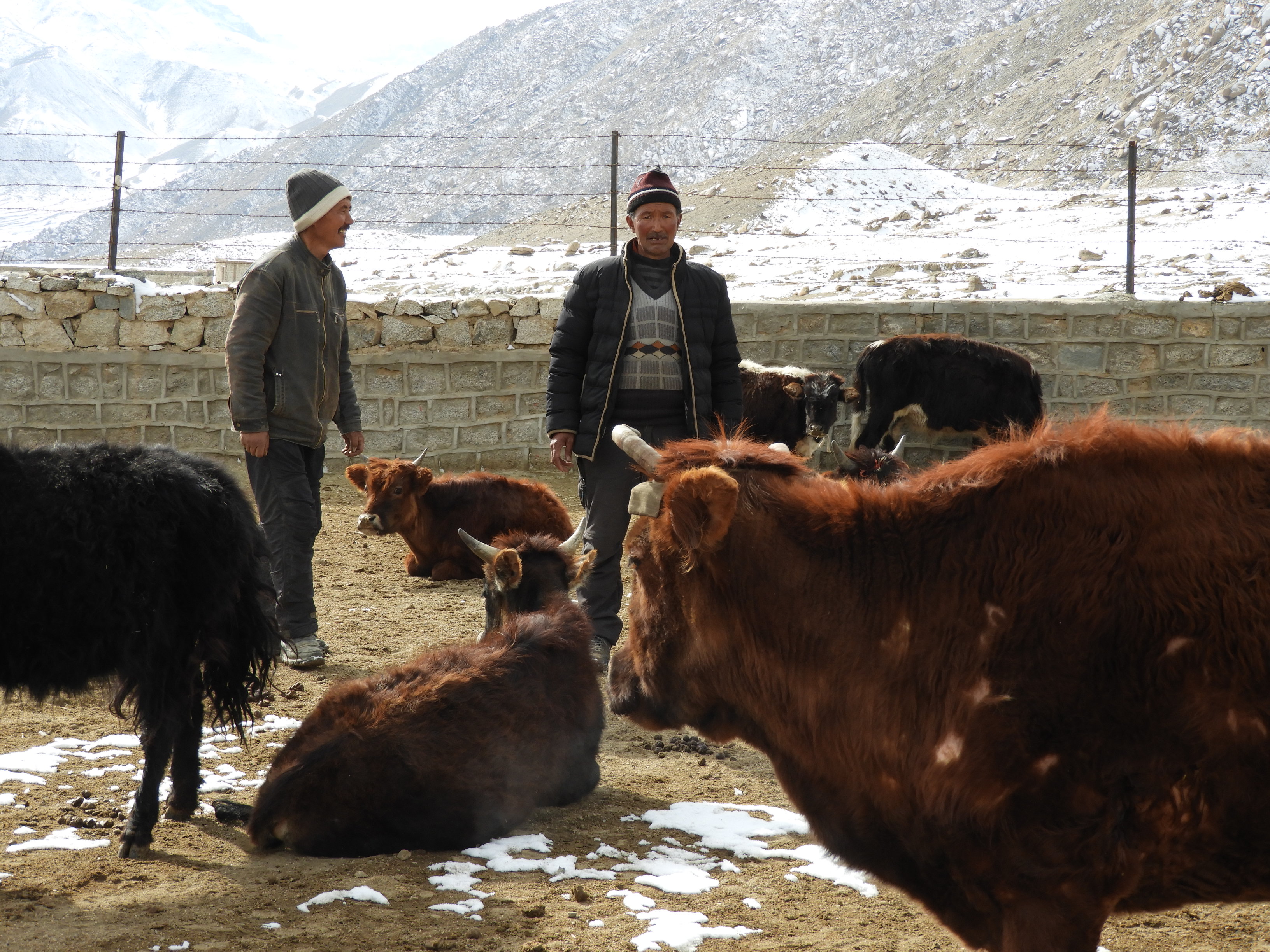
Thanks to such efforts from this compassionate soul and others who have aided him, hundreds of slaughter house-bound animals have been saved.
It’s the belief of the people of Ladakh in ‘Tsetar’ that injects a real dose of compassion into human action.
“People adopted 80 such animals during a religious event in my village once. Initially, many people, including members of my own family were apprehensive of my initiative. Now their opinion has shifted. They help me take care of animals. Since, last year, many families have brought their animals to the animal shelter care. Saving the animals and running the shelter care has brought me great joy and inner peace. It serves as a constant motivation,” says Dorjey.
Despite the region’s rough terrain, the spirit of non-violence and protection for all living beings is integral to Ladakhi culture. For Dorjey, inspiration also comes from the teachings of His Holiness, the Dalai Lama, who often visits the region to impart key lessons on Buddhist philosophy.
Also Read: Serving for Decades, Ladakh’s 75-YO ‘First Doctor’ Just Won Padma Shri
In a separate conversation with ‘Reach Ladakh’, a Leh-based publication, he says, “Animals are considered as sentient beings. Moreover, the doctrine of rebirth holds that any human could be reborn as an animal, and any animal could be reborn as a human. We are born human for a reason: Let us stand up for weaker species and make it meaningful. We don’t have the right to inflict pain or suffering on any living being, but we do have the right and means to stop it from happening.”
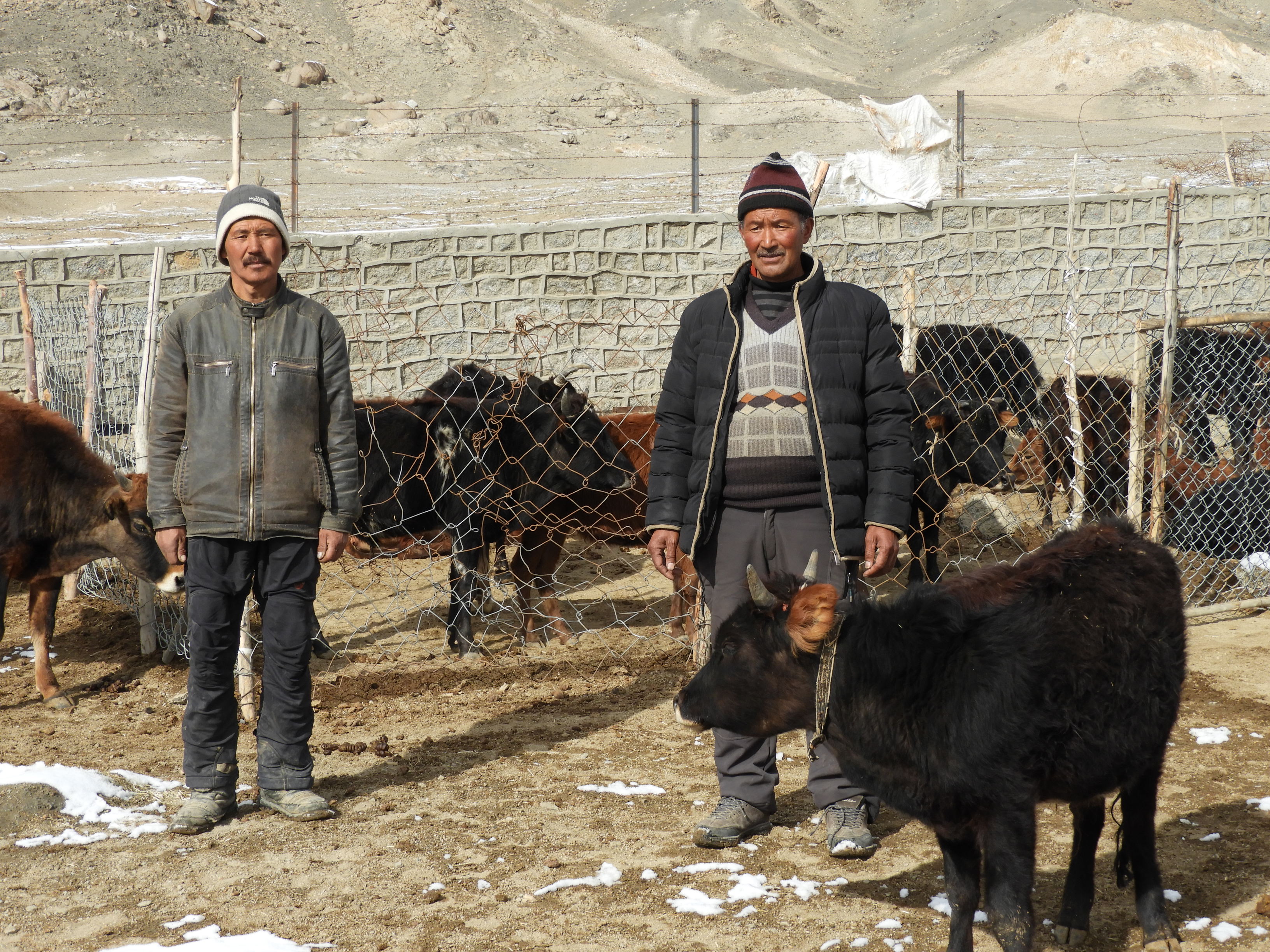
What are Dorjey’s plans for the future? Without the necessary financial support, he admits, it will be very difficult for him to run the shelter single-handedly. He plans to charge Rs 5,000 for every animal released into his care, but he’s also looking toward local authorities to assist him.
If you want to help Dorjey run his animal shelter, you can donate to the following bank account:
Taru Gayphel Tsogspa
Account no: 0357040100007076
J&K Bank Branch-Skalzangling
IFSC Code: JAKA0SKALZA
(Edited by Saiqua Sultan)
Like this story? Or have something to share?
Write to us: [email protected]
Connect with us on Facebook and Twitter.
Find Out What’s Good Today – Sign Up Now!
This story made me
-
97
-
121
-
89
-
167
Tell Us More
If you found our story insightful, informative, or even just enjoyable, we invite you to consider making a voluntary payment to support the work we do at The Better India. Your contribution helps us continue producing quality content that educates, inspires, and drives positive change.
Choose one of the payment options below for your contribution-
By paying for the stories you value, you directly contribute to sustaining our efforts focused on making a difference in the world. Together, let's ensure that impactful stories continue to be told and shared, enriching lives and communities alike.
Thank you for your support. Here are some frequently asked questions you might find helpful to know why you are contributing?






